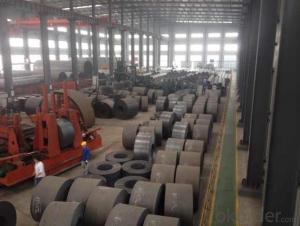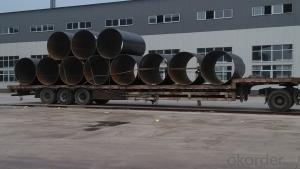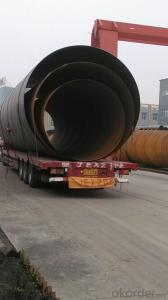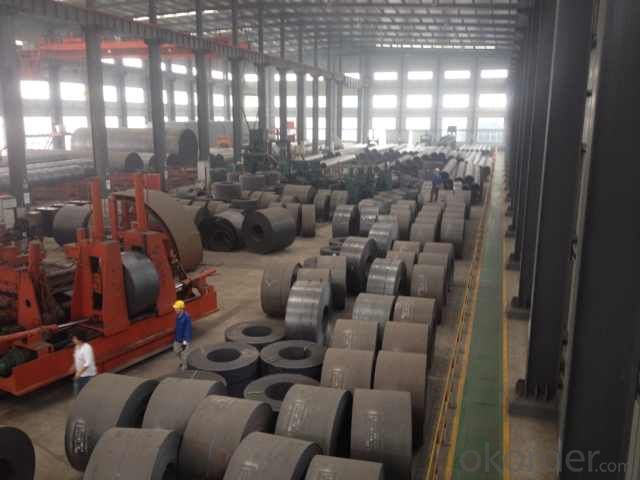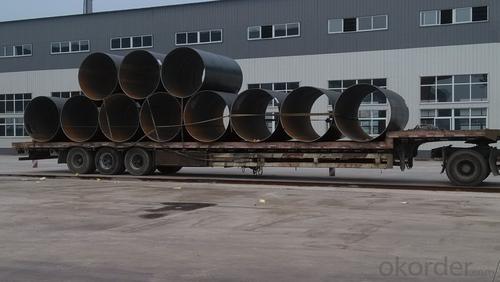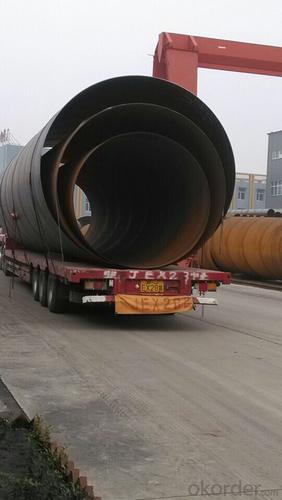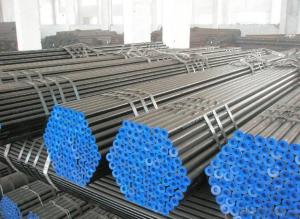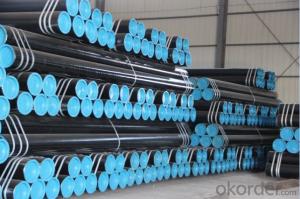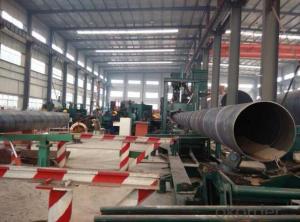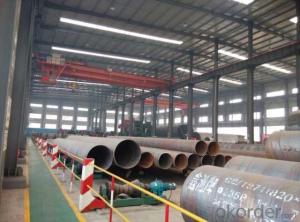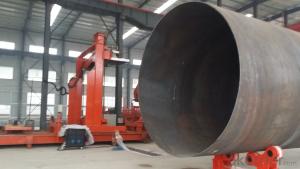SSAW STEEL PIPE 219-3920MM ASTM A53 GR.B
- Loading Port:
- China Main Port
- Payment Terms:
- TT OR LC
- Min Order Qty:
- -
- Supply Capability:
- -
OKorder Service Pledge
OKorder Financial Service
You Might Also Like
Packaging & Delivery
Packaging Detail: | standard export packing or as customer's requirement |
Delivery Detail: | within 10 - 30 days |
Specifications
Spiral Welded Steel Pipes and Tubes
1.Material:Q195-Q235
2.Length:1-12m
3.WT:1.0-14mm
4.O.D.:219-3920mm
Product Description:
1.Material : Q235,Q345,L245,L290,L360,L415,L450,L485,GrB,X42,46,X52,X56,X60,X65,X70,X80,X100
2,Standard: SY/T5037-2000,GB/T9711-2011,API Spec 5L PSL1/PSL2,ASTM A252\A53,ISO3183,DIN17172,EN10217,JIS G3457,AWWA C200,ASTM A139,ASTM A671,ASTM A672
3.Wall thickness: 3.0mm-30mm
4.Outer diameter: φ219mm-3920mm
5,Length: 5m-12m or as customer requirement
6,Corrosion protection standard: DIN30670,DIN30671, AWWAC210, AWWA C203, SY/T0413-2002,SY/T0414-2002
7,Application: Oil, gas, natural gas, water pipe, thermal electricity pipe, steel structure engineering, etc
Q195-Q345 Material Steel Pipe's Materials
Elements | Chemical Compsition% | Mechanical Property | ||||||
| C% | Mn% | S% | P% | Si% | Yield Point (Mpa) | Tensile Strength(Mpa) | Elongation |
Q195 | 0.06-0.12 | 0.25-0.50 | <0.050 | <0.045 | <0.030 | >195 | 315-430 | 32-33 |
Q215 | 0.09-0.15 | 0.25-0.55 | <0.05 | <0.045 | <0.030 | >215 | 335-450 | 26-31 |
Q235 | 0.12-0.20 | 0.30-0.70 | <0.045 | <0.045 | <0.030 | >235 | 375-500 | 24-26 |
Q345 | <0.20 | 1.0-1.6 | <0.040 | <0.040 | <0.55 | >345 | 470-630 | 21-22 |
- Q: Are steel tubes and round steel in weight or length when purchased?
- It's priced by weight. The cutting process should size to determine the length (otherwise - please specify the weight of the material), the material ration to calculate weight for cost accounting as.
- Q: How are steel pipes used in the automotive manufacturing industry?
- Steel pipes are commonly used in the automotive manufacturing industry for various applications such as exhaust systems, fuel lines, and structural components. They provide durability, strength, and resistance to heat and corrosion, making them ideal for withstanding the harsh conditions of vehicles.
- Q: Can steel pipes be galvanized?
- Yes, steel pipes can be galvanized. Galvanizing is a process of applying a protective zinc coating to steel or iron to prevent corrosion. The steel pipes are submerged in a bath of molten zinc, which forms a metallurgical bond with the steel, creating a corrosion-resistant coating. Galvanizing is commonly used in various applications, such as plumbing, construction, and outdoor structures, to extend the lifespan of steel pipes and prevent rusting.
- Q: How are steel pipes sized and classified?
- Steel pipes are sized and classified primarily based on their outer diameter (OD) and wall thickness. The sizing of steel pipes is standardized to ensure compatibility and ease of use in various applications. The most common method of sizing steel pipes is by nominal pipe size (NPS), which is a North American standard that refers to a pipe's OD. NPS sizes range from 1/8 inch to 36 inches, with each size corresponding to a specific OD. For example, a 1/2-inch NPS pipe has an OD of 0.84 inches, while a 12-inch NPS pipe has an OD of 12.75 inches. It is important to note that the OD of a pipe may not necessarily match its actual measurement, as it is based on historical pipe dimensions. Additionally, steel pipes are classified into different schedules, which indicate the wall thickness of the pipe. The most common schedules are SCH 5, SCH 10, SCH 40, SCH 80, and SCH 160, with higher numbers representing thicker walls. These schedules are standardized and help in selecting the appropriate pipe for a given application. Furthermore, steel pipes may be further classified based on their end connections. The most common types include threaded, plain-end, and socket-weld connections. Threaded pipes have screw threads on both ends, allowing for easy assembly and disassembly. Plain-end pipes have no threads and are usually joined using welding techniques. Socket-weld pipes have a socket-like end that allows for welding with a corresponding fitting. In summary, steel pipes are sized and classified based on their outer diameter, wall thickness, and end connections. The nominal pipe size (NPS) indicates the outer diameter, while the schedule number represents the wall thickness. Understanding the sizing and classification of steel pipes is crucial in selecting the appropriate pipe for specific applications in industries such as construction, oil and gas, plumbing, and manufacturing.
- Q: What are the uses of welded steel pipes?
- Straight seam welded steel pipe (YB242-63) is a steel pipe whose welding seam is parallel to the steel tube. Usually divided into metric welded steel pipe, welded thin-walled pipe, transformer, cooling tubing, and so on.
- Q: What are the different types of steel pipe tees?
- Various plumbing and piping applications commonly utilize different types of steel pipe tees. These tees serve various purposes and offer specific functionalities. 1. Equal tee: This tee consists of three branches of the same size, ensuring an equal flow of fluid or gas through each branch. 2. Unequal tee: As suggested by its name, an unequal tee features branches of varying sizes. This allows for merging or diversion of flows with different volumes or pressures. 3. Reducing tee: This tee is deployed when the branch size is smaller than the main pipe size. It enables a reduction in size while maintaining the flow in the main line. 4. Barred tee: In situations involving the insertion or removal of a pipeline-cleaning and inspection device known as a pig, a barred tee is employed. It possesses a bar welded across one or two branches to create a bypass for the pig. 5. Lateral tee: A lateral tee has a branch angle of either 45 degrees or 90 degrees, facilitating the perpendicular alignment of the branch line with the main line. It finds extensive use in fire sprinkler systems and scenarios necessitating a change in direction. 6. Compression tee: This tee is suitable for gas or hydraulic systems, where branches are connected using compression fittings rather than welding or threading. 7. Butt-weld tee: High-pressure and high-temperature applications employ butt-weld tees. These tees are welded to the main pipe using butt-welding techniques, ensuring a robust and leak-proof connection. These represent some of the most prevalent types of steel pipe tees employed across diverse industries. The selection of the appropriate tee depends on specific project requirements, such as pipe size, flow rates, and transported materials.
- Q: How are steel pipes protected during transportation?
- Steel pipes are protected during transportation through a variety of measures to ensure their safety and integrity. One common method is the use of protective coatings on the exterior of the pipes. These coatings, such as epoxy or polyethylene, serve as a barrier against external factors like moisture, corrosion, and physical damage. Additionally, the pipes are often bundled together and secured with strapping or bands to prevent movement and potential collisions during transit. In some cases, pipes may also be placed within wooden crates or containers for added protection against impact and handling. Furthermore, careful loading and unloading procedures are followed to minimize any stress or strain on the pipes. By implementing these protective measures, steel pipes can safely reach their destination without compromising their quality or structural integrity.
- Q: What are the different methods of cutting steel pipes?
- There are several different methods of cutting steel pipes, including manual methods such as hacksaw or pipe cutter, as well as mechanical methods like band saw, plasma cutting, or laser cutting. Each method has its own advantages and is chosen based on factors such as the thickness of the pipe, precision required, and production volume.
- Q: What are the factors to consider while selecting steel pipes for a project?
- When choosing steel pipes for a project, there are several key factors to take into account. These factors encompass the material composition of the steel, the dimensions of the pipes, the intended use, the environmental conditions, and the allocated budget. Firstly, the material composition of the steel pipes plays a vital role in determining their strength, resistance to corrosion, and overall durability. Carbon steel, stainless steel, and alloy steel are commonly used types of steel for pipes, each possessing unique characteristics suitable for different applications. Secondly, the dimensions of the pipes, including diameter and wall thickness, should be carefully considered. It is crucial to ensure that these dimensions align with the project requirements and the system in which the pipes will be installed. This ensures that the selected pipes can effectively handle the required flow rates and pressures. Thirdly, thorough assessment of the intended application of the steel pipes is necessary. Different projects may demand pipes with specific features, such as heat resistance, pressure resistance, or the ability to transport particular substances like gas, oil, or water. Understanding these application requirements aids in selecting the appropriate type of steel pipes. Evaluation of the environmental conditions in which the pipes will be installed is also important. Factors such as temperature fluctuations, exposure to moisture, corrosive substances, and external pressures must be taken into account. For example, if the project involves underground installation or exposure to corrosive chemicals, corrosion-resistant steel pipes may be necessary. Lastly, the allocated budget for the project is a significant consideration. The cost of steel pipes can vary depending on their material composition, dimensions, and additional features. Striking a balance between project requirements and available budget ensures cost-effectiveness without compromising the quality and performance of the pipes. In conclusion, the selection of steel pipes for a project necessitates careful consideration of factors including material composition, pipe dimensions, intended application, environmental conditions, and budget. By thoroughly evaluating these factors, one can choose the most suitable steel pipes that meet project requirements, ensuring long-term performance and durability.
- Q: What is the role of steel pipes in the construction of bridges?
- Steel pipes play a vital role in the construction of bridges as they are used for various purposes such as providing structural support, carrying water or gas, and facilitating the transportation of electrical and communication cables. Their strength, durability, and ability to withstand heavy loads make them an essential component in bridge construction, ensuring the stability and longevity of the structure.
Send your message to us
SSAW STEEL PIPE 219-3920MM ASTM A53 GR.B
- Loading Port:
- China Main Port
- Payment Terms:
- TT OR LC
- Min Order Qty:
- -
- Supply Capability:
- -
OKorder Service Pledge
OKorder Financial Service
Similar products
Hot products
Hot Searches
Related keywords
